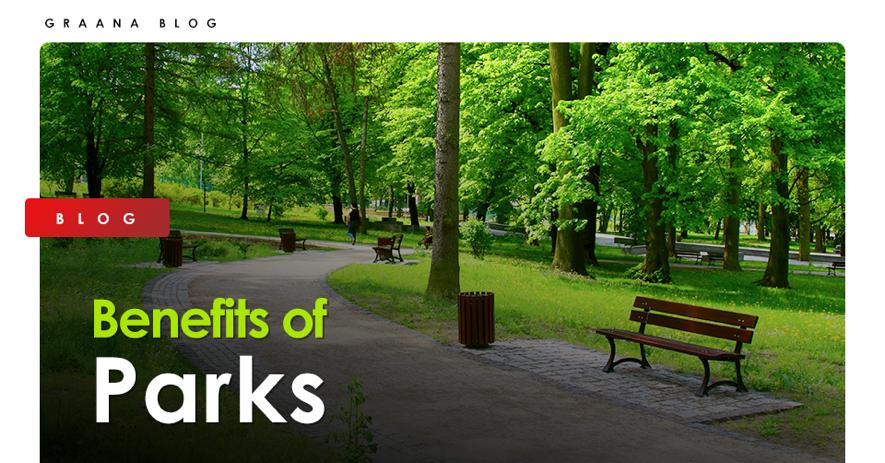Parks are an important component of any community. They have a tremendous impact on children’s growth as well as the happiness of the entire community. The benefits of community parks to the surrounding neighbourhood are numerous. Parks provide several benefits to residents, ranging from a safe environment for physical activity to increased property prices in the nearby area. Community parks may be one of the only ways for residents in metropolitan areas to experience nature while still staying active.
Parks and playgrounds have the potential to become the beating hearts of communities, thus community planners should prioritise these recreational areas. Parks are more than just green places that help to beautify a neighbourhood.
Graana.com has compiled a list of benefits of parks you need to know.
Community Building
Parks allow individuals in the neighbourhood to communicate with one another and meet new people. They’re also excellent places to hold events and indulge in recreational activities. People can build a sense of community as a result of this. A park is ideal for a family picnic or a gathering space for locals, depending on what your area requires.
In addition, increasing the number of parks and recreational amenities in a neighbourhood lowers crime rates, particularly among youth. By providing a safe environment for young people to socialise with one another, they are kept off the streets and out of danger. Green spaces in city parks draw people in and serve as a gathering place for neighbours to develop social relationships that result in better, safer communities. This sense of community not only promotes safety but also increases people’s sense of belonging to their communities.
Better Air Quality
When it comes to air pollution, even a slight increase in the number of city parks or their size can make a tremendous effect. Air pollution from automobiles and industrial plants can be hazardous to urban residents. This problem can be mitigated by planting trees in recreational areas. Trees and green spaces not only remove pollution, but they also use carbon dioxide to make food, removing it from the atmosphere and assisting in the reduction of climate change.
Physical Health
Parks make walking through a neighbourhood more pleasant and give room for popular sports, increasing physical activity. A lack of physical activity is the root of many problems. Obesity is strongly connected to today’s sedentary lifestyle, which can lead to a variety of health problems, including cancer and heart disease. When children can play outside rather than inside, the benefits of physical activity are amplified. Better test scores, better cognitive function, fewer behavioural problems, fewer indicators of ADHD, and more self-discipline are all benefits of spending time outside. Parks give opportunities for residents to go outside and be energetic, promoting a healthier attitude.
Parks have been related to increased aerobic exercise in studies. People who were active at least three times a week increased by 25.6 per cent after visiting local green spaces. This is especially crucial for low-income families who cannot afford a gym membership or others who do not have the time to go to the gym.
Mental Health
The wellness benefits extend past encouraging better physical health, parks and recreation areas can also help improve mental health. A 10% increase in local green space resulted in a reduction in health complaints. Simply looking at nature-inspired surroundings resulted in claims of less anxiety and anger, as well as increased concentration and tranquillity. Communities must work to improve the well-being of their citizens. Creating recreation areas is one way to meet both mental and physical requirements.
Decrease in temperature
The urban heat island effect is caused by the prevalence of flat, dark surfaces consisting of asphalt and concrete in cities. This causes urban areas to be substantially warmer than neighbouring locations and is a primary contributor to smog formation. This effect can be mitigated by even a minor increase in the number of trees in the neighbourhood. Through a combination of increasing park area and green roofs, it may be virtually eradicated from cities. With summer temperatures rising as a result of climate change, finding relief from the heat becomes even more important. Parks have cooler temperatures than the rest of the city. A park can be 13 degrees Fahrenheit cooler at night than the streets surrounding it.
Enhancing the value of real estate property
Parks are viewed as a desired asset by homeowners. As a result, the closer a residence is to a recreational place, the higher its value. With higher property values, your city may be able to collect more property taxes, allowing it to further develop the neighbourhood. People will pay more for residences that are closer to parks. People are ready to pay 10% extra for a home in the city that is within a quarter-mile of a park. Greenbelts adjacent to residential communities raise home prices by 32 per cent. Both homeowners and local governments benefit from natural regions in terms of real estate.
Parks are critical to our city’s healthy development and should be a fundamental component of any city planning. Everyone in the community benefits from parks. These are just a few of the reasons why we must fight for parks in our communities.




